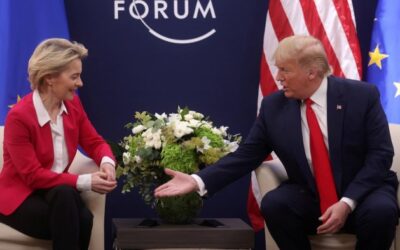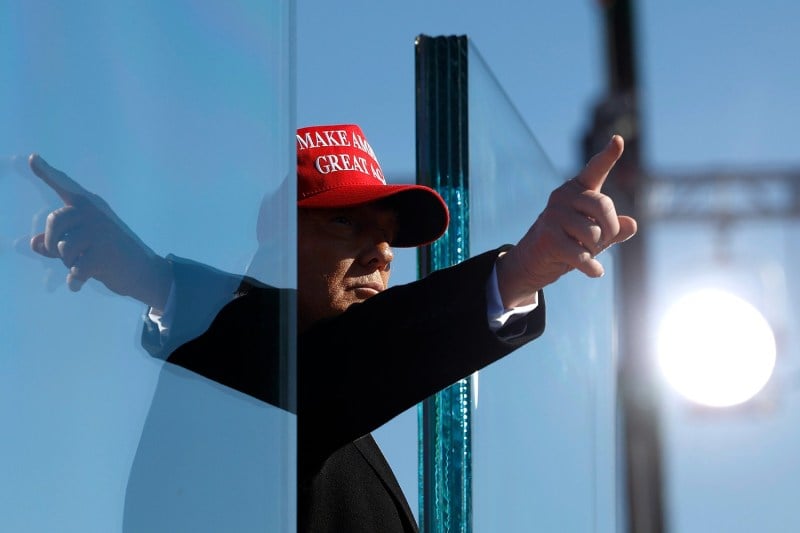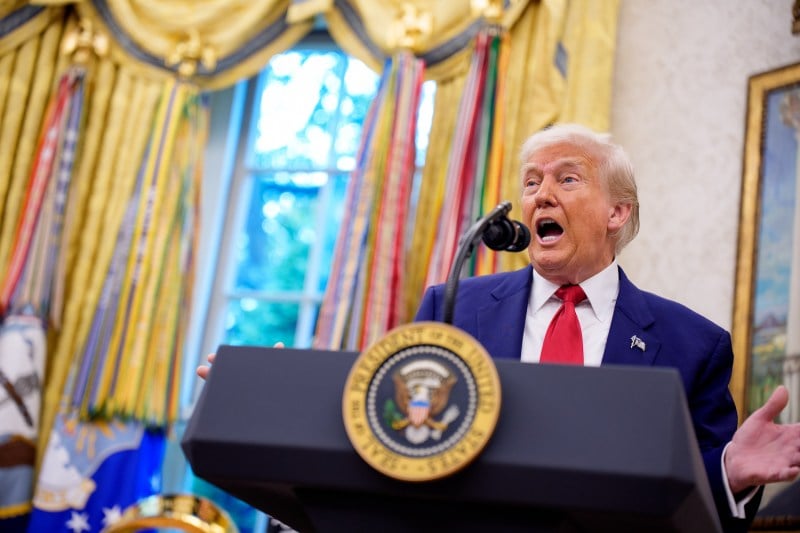Trump’s ‘Reciprocal Tariffs’ Roil Global Markets

Trump’s ‘Reciprocal Tariffs’ Roil Global Markets
The White House appears optimistic about negotiations, but fear of a global recession looms.
A trader works on the floor of the New York Stock Exchange at the opening bell in New York City on April 7. Timothy A. Clary/AFP via Getty Images
Welcome back to World Brief, where we’re looking at the global response to U.S. tariffs, Israeli Prime Minister Benjamin Netanyahu visiting the White House, and some Iranian-backed militias in Iraq considering disarming.
Eyes on the Markets
U.S. President Donald Trump is not backing down from his explosive tariffs. The sweeping duties, announced last Wednesday, have ignited fears of a global recession, as countries race to either negotiate with or retaliate against Washington and stock markets seesaw between quick surges and record-breaking lows.
Welcome back to World Brief, where we’re looking at the global response to U.S. tariffs, Israeli Prime Minister Benjamin Netanyahu visiting the White House, and some Iranian-backed militias in Iraq considering disarming.
Eyes on the Markets
U.S. President Donald Trump is not backing down from his explosive tariffs. The sweeping duties, announced last Wednesday, have ignited fears of a global recession, as countries race to either negotiate with or retaliate against Washington and stock markets seesaw between quick surges and record-breaking lows.
On Monday, Trump threatened to take his trade war to yet new heights, writing on Truth Social that he will put additional 50 percent tariffs on China if Beijing does not remove its recently announced 34 percent retaliatory duties on the United States by Tuesday. He also threatened to terminate all requested talks with China. If Trump’s latest threat is enacted, it could bring the total average tariff on Chinese goods entering the United States to a whopping 126 percent.
Beijing declared the 34 percent countermeasure last Friday, which will go into effect on April 10 and be imposed on all U.S. imports, without carve-outs for certain products such as energy, as the White House has done.
“This is a significant escalation of China’s response,” Leah Fahy, a China economist at Capital Economics, wrote on Friday after Beijing’s announcement. “[Chinese President] Xi Jinping appears to feel that China’s economy is strong enough to withstand whatever Trump throws at it next.”
Not all foreign leaders have taken the hard-and-fast approach. European Commission President Ursula von der Leyen offered the United States “zero-for-zero tariffs for industrial goods” in a video post on Monday. “Europe is always ready for a good deal, so we keep it on the table,” she said. Several U.S. Republican lawmakers have urged Trump to seize the opportunity. “At some point, you have to take YES for an answer,” Sen. Ron Johnson posted on X.
At the same time, though, a senior European Union official said on Monday that the bloc is still considering retaliatory tariffs separate from those set to be imposed in response to 25 percent U.S. duties on steel and aluminum. This new round could hit up to $28 billion worth of U.S. goods. As for metals tariffs, EU member states are expected to vote this week on a final list of U.S. products that will be targeted, with duties to begin taking effect on April 15.
Trump remains optimistic that investors shouldn’t worry about massive selloffs or hiked inflation. “I spoke to a lot of leaders, European, Asian, from all over the world. They’re dying to make a deal,” he said on Sunday after spending the weekend playing golf in Florida.
Meanwhile, global markets continue to react. Within just a few hours on Monday, the S&P 500 plunged 4.7 percent, gained back 3.4 percent, and then flatlined around midday; the index is coming off its worst week since COVID-19 torpedoed the global economy in March 2020. Stocks in Hong Kong plummeted 13.2 percent in their worst day since 1997; U.S. crude oil dipped below $60 per barrel for the first time since 2021; and bitcoin sank below $80,000, down from its record in January.
Today’s Most Read
- Will Trump Back Down From a Global Trade War? by Bob Davis
- Tariffs Can Actually Work—if Only Trump Understood How by Michael Hirsh
- Hong Kong’s Warning Signs for America by Lili Pike
The World This Week
Tuesday, April 8: Israel’s Supreme Court hears petitions against the removal of Shin Bet chief Ronen Bar, before his dismissal is due to take effect on April 10.
NATO Secretary-General Mark Rutte begins a two-day trip to Japan.
EU foreign-policy chief Kaja Kallas visits Albania and Bosnia and Herzegovina.
Wednesday, April 9: Honduras hosts a Community of Latin American and Caribbean States summit.
Congolese officials and Rwandan-backed M23 rebels hold formal peace talks in Doha, Qatar.
Kallas chairs the EU-Ukraine Association Council in Brussels.
Thursday, April 10: Taiwan begins weeklong air raid and disaster response exercises.
Defense ministers with the “coalition of the willing” convene in Brussels.
Friday, April 11: The Ukraine Defense Contact Group convenes in Brussels.
Kazakhstan hosts a Commonwealth of Independent States foreign ministers’ meeting.
Saturday, April 12: Gabon holds a presidential election.
Sunday, April 13: Ecuador holds a presidential election runoff.
What We’re Following
Control of Gaza. Israeli Prime Minister Benjamin Netanyahu traveled to Washington on Monday for his second in-person meeting with Trump since the latter’s return to office. The Israeli leader said ahead of the meeting that they would discuss U.S. tariffs—Washington has imposed 17 percent duties on Israel—as well as other top concerns of Netanyahu’s, including the Israel-Hamas war, threats from Iran, and the ongoing International Criminal Court case against Netanyahu.
The meeting comes as Israel significantly expands its military operations in Gaza. As of Monday, Israel has control of more than 50 percent of the territory in what it says is an effort to pressure Hamas to release its remaining hostages. However, Netanyahu said last week that even if Hamas is defeated, Israel will maintain security control of the territory and work to implement what he called Trump’s “voluntary migration plan” for its Palestinian residents.
In response to deadly Israeli military strikes in Gaza, Hamas on Sunday fired rockets at southern Israel, with local media reporting that at least one projectile directly hit the city of Ashkelon; 12 people were injured in the attack.
Disarmament talks. Four Iranian-backed militia groups in Iraq are considering disarming for the first time, Reuters reported on Monday. According to local commanders and Iraqi officials, the move is an effort to defuse tensions with the United States, which has privately threatened to target these militant groups with airstrikes if Baghdad does not take serious actions to disband them. The commanders who spoke to Reuters were from Kataib Hezbollah, Harakat Hezbollah al-Nujaba, Kataib Sayyid al-Shuhada, and Ansar Allah al-Awfiya.
“Trump is ready to take the war with us to worse levels,” said a commander of Kataib Hezbollah, one of the Iranian-backed groups. “We know that, and we want to avoid such a bad scenario.”
Talks between Iraqi Prime Minister Mohammed Shia al-Sudani and several militia leaders are “very advanced,” Iraqi politician Izzat al-Shahbndar said. “The factions are not acting stubbornly or insisting on continuing in their current form,” he added, as they are “fully aware” that they could be targeted by Washington.
The militias are part of the Islamic Resistance in Iraq, an umbrella term used by a network of armed Iran-backed Shiite groups in Iraq that collectively command tens of thousands of fighters as well as massive arsenals. The groups have launched dozens of missile and drone attacks on Israel as well on U.S. forces and personnel in Iraq and Syria since the Israel-Hamas war began in October 2023.
New strategic partnership. French President Emmanuel Macron traveled to Cairo on Monday to meet with Egyptian President Abdel Fattah al-Sisi. The two signed joint declarations upgrading bilateral relations to a strategic partnership, boosting their educational collaboration; railway manufacturing; and cooperation in artificial intelligence, cybersecurity, and green hydrogen production.
The two leaders spent much of their meeting also discussing the war in Gaza. “We condemn the Israeli escalation, which has had catastrophic consequences for civilians,” Macron said in a joint statement with Sisi, while adding that “Hamas must not have any role in Gaza’s governance moving forward, as it continues to pose a threat to Israel.” The two leaders, alongside Jordan, said the territory must be governed only by the Palestinian Authority, which oversees parts of the West Bank.
A key purpose of Macron’s visit was to discuss a postwar future for Gaza, including Trump’s controversial proposal to displace all Palestinians in the territory to neighboring countries, such as Egypt. Both Macron and Sisi have rejected calls to remove Gaza’s population, and on Monday, they reaffirmed their support for an Arab-led reconstruction plan.
Odds and Ends
Britain’s King Charles III showed off his musical chops last Thursday alongside the renowned (and delicious) London Vegetable Orchestra. During an event at Windsor Castle meant to celebrate those involved in music, the monarch performed “Twinkle, Twinkle, Little Star” on a recorder made out of a carrot. The four-person ensemble told Charles that he could keep the homegrown instrument. No word on if he took them up on the offer.
Alexandra Sharp is the World Brief writer at Foreign Policy. X: @AlexandraSSharp
More from Foreign Policy
-

American flags are draped around tables and pipes in a small factory room as women work at sewing machines to produce them. Tariffs Can Actually Work—if Only Trump Understood How
Smart trade policy could help restore jobs, but the president’s carpet-bomb approach portends disaster.
-

Donald Trump looks up as he sits beside China’s President Xi Jinping during a tour of the Forbidden City in Beijing on Nov. 8, 2017. Asia Is Getting Dangerously Unbalanced
The Trump administration continues to create headlines, but the real story may be elsewhere.
-

Trump announces tariffs Trump’s Wanton Tariffs Will Shatter the World Economy
Economic warfare is also a test for U.S. democracy.
-

The Department of Education building in Washington, DC on March 24. Why Republicans Hate the Education Department
Broad popular support means that even Ronald Reagan failed at dismantling the agency.







Join the Conversation
Commenting on this and other recent articles is just one benefit of a Foreign Policy subscription.
Already a subscriber?
.
Subscribe
Subscribe
View Comments
Join the Conversation
Join the conversation on this and other recent Foreign Policy articles when you subscribe now.
Subscribe
Subscribe
Not your account?
View Comments
Join the Conversation
Please follow our comment guidelines, stay on topic, and be civil, courteous, and respectful of others’ beliefs.
Change your username |
Log out
Change your username:
CANCEL
Confirm your username to get started.
The default username below has been generated using the first name and last initial on your FP subscriber account. Usernames may be updated at any time and must not contain inappropriate or offensive language.